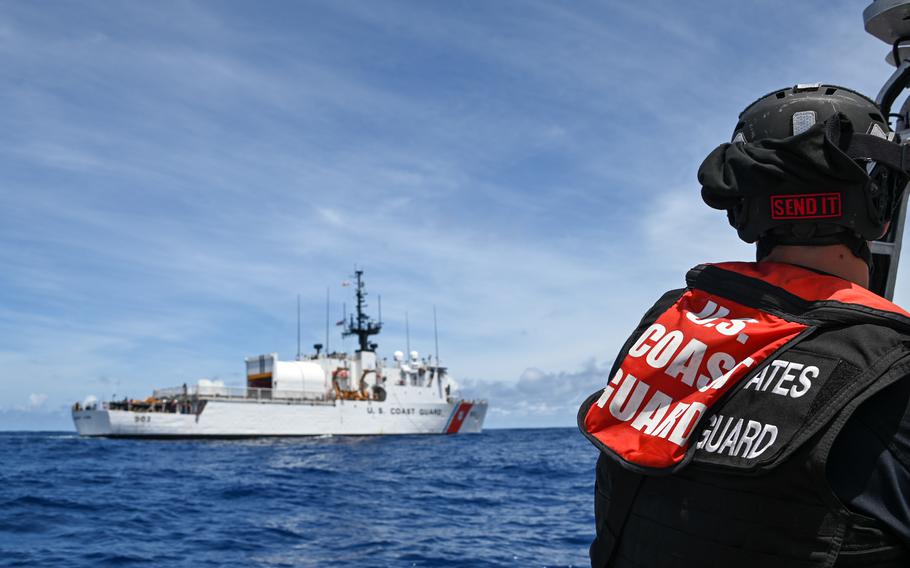
Boarding team members in a small boat prepare to pull alongside the U.S. Coast Guard Cutter Harriet Lane for a passenger transfer in the Pacific Ocean on Feb. 6, 2024. (Charly Tautfest/U.S. Coast Guard)
WASHINGTON — The Coast Guard’s personnel shortage is expected to grow worse in 2024, impacting the service’s ability to respond to a hurricane or an oil spill or other major disaster, a service commandant told lawmakers on Wednesday.
The maritime force is operating with a deficit of about 4,800 members, or nearly 10% of its workforce, and anticipates an even larger shortfall this year due to struggles with recruiting, said Vice Adm. Paul Thomas, deputy commandant for mission support for the Coast Guard.
Thomas told a subpanel of the House Transportation and Infrastructure Committee that day-to-day operations, such as search and rescue, remain intact but the Coast Guard’s capacity to mount a mass response to a large-scale emergency will degrade as its ranks decrease.
“We are losing our surge force,” he said. “If we had to respond to a hurricane or oil spill or crisis on the southwest border like we have in the past, then you would see some real problems with regard to our ability to maintain our regular missions.”
The Coast Guard, like most military services, has faced a “fierce competition” for talent, Thomas said. It is also attempting to regain trust after the disclosure last year of a hidden internal investigation into mishandled reports of sexual assault and harassment at the Coast Guard Academy between 1990 and 2006.
Efforts to introduce reforms to address sexual misconduct have lagged. The Coast Guard has so far completed five of the 33 actions recommended in a recent review, according to Heather MacLeod, a director for the Government Accountability Office’s homeland security and justice team.
“With an estimated shortage of roughly 4,800 members, the Coast Guard has both a moral and functional need to implement culture change so women and men want to join and stay in the service,” said Rep. Rick Larsen of Washington, the lead Democrat on the committee.
Thomas said the service plans to execute most of the remaining recommendations for a safer and more respectful work environment within six months to a year. Other reforms will take longer to implement because they require more investment and people, he said.
The Coast Guard remains “cautiously optimistic” about its ongoing efforts to grow its ranks, Thomas said. It has eased policies on tattoos and other body markings, ended discrimination against certain medical conditions and will give potential recruits a chance to get in shape and boost their test scores to become eligible for boot camp.
In the meantime, the Coast Guard has had to reduce staffing standards at shoreside stations, temporarily close seasonal stations and decommission cutters from its fleet ahead of schedule, according to Rep. Daniel Webster, R-Fla., the subcommittee chairman.
Larsen said the Coast Guard is chronically underfunded and is a “$20 billion service operating on a $13 billion budget.”
Thomas said the service is looking for ways to reduce the burden shouldered by its workforce and is consolidating the search-and-rescue system in areas where there is overlapping coverage. The shortage of personnel has had a very real impact on operations, he said.
“Lack of workforce is hurting our ability to conduct missions at the same places and levels that we have in the past,” Thomas said.